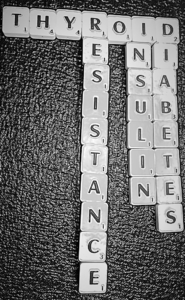Thyroid Hormone Imbalances and blood sugar problems
Thyroid hormones imbalances, both hyper and hypothyroidism can cause poor blood sugar control, increase the risk of insulin resistance and the risk of developing type 2 diabetes due to effects of thyroid hormones on the production, demand and performance of insulin in the body and common genetic factors. There is plenty of scientific evidence supporting the contribution of thyroid hormonal imbalances to Type 2 Diabetes Mellitus. All hormonal system are intertwined. Autoimmune thyroid conditions also increase the risk of Type 1 Diabetes Mellitus ( autoimmune illness) and vice versa.
Blood sugar needs to be kept at between 3.9 and 5.5 mmol/L (70 to 100 mg/dL). It is regulated by few factors: glucose storage and release from glycogen by the liver, intestinal absorption, glucose uptake in muscles and fat cells and the production of insulin by pancreas. Insulin is a hormone made in pancreas which takes the sugar out of blood when it gets too high.
Thyroid hormone imbalances change expression of certain genes and production of proteins which can affect insulin sensitivity of cells. They also cause changes in plasma fatty acids which also modulate insulin sensitivity.
Insulin resistance happens when the insulin receptors in body cells do not respond properly to insulin and so the sugar from blood cannot be taken inside of cells to produce energy. Insulin resistance can progress and lead to Type 2 Diabetes Mellitus, a conditions where pancreas can no longer produce enough insulin to overcome insulin resistance.
Thyroid hormone is the hormone that starts the energy production inside of the cells and insulin helps to supply the cells with fuel-glucose. The hormonal systems work together so it is clear that imbalance of one will imbalance the other.
Hyperthyroidism
The increase in thyroid hormones signals the body to rapidly increase energy production and stimulates liver through the sympathetic nervous system. That is the main reason for glucose intolerance. The needs for glucose increase to keep up with an increased metabolic rate. Growth hormone somatotropin is released accelerating the production of liver glycogen to glucose. There is also a rapid glucose absorption from the intestine. In Graves’ disease, more proinsulin is secreted from the pancreas. It is however not properly converted to insulin. Insulin is also more rapidly degraded in kidneys. Hyperthyroidism is associated with insulin resistance of liver cells. The liver cells overproduce glucose and are ‘deaf’ to insulin signals. However, the skeletal muscle cells have an increased glucose absorption. The production of energy from glucose is changed towards glycolysis and lactate formation in muscles. It has been shown in Japanese studies that people with Graves’ disease are twice as much of a risk of developing non insulin-dependent diabetes (type II) diabetes when compared to a healthy population (1).
A medication, called thiazolidinedine, used sometimes to increase insulin sensitivity should not be given to people with type 2 diabetes, thyroid autoimmunity and ophthalmopathy as it may worsen the eye condition (7). Also when people with thyrotoxicosis (excessive thyroid hormones) and diabetes are given too much insulin, they at risk of diabetic ketoacidosis, which increases the risk of a cardiac arrest, therefore these two conditions of hyperthyroidism and diabetes need to be controlled properly.
Unfortunately, there is also an increased chance of developing Type 1 Diabetes, which is Insulin Dependent Diabetes Mellitus, an autoimmune condition. People with thyroid dysfunction (not related to autoimmunity) do not have an increased chance of developing Type 1 Diabetes Mellitus which is an autoimmune illness. Type 1 Diabetes Mellitus can co-occur with Graves’ disease as both are autoimmune conditions and they have common genetic components. This is often seen in younger people with Graves’ disease. The chance of having another autoimmune illness with Graves’ disease is about 9-10% and slightly higher for Hashimoto’s thyroiditis (19).
Hypothyroidism
T3 is an extremely potent elixir of life. Hypothyroidism and insulin resistance go together. Lack of T3 (even sub-clinical) may lead to blood sugar problems, insulin resistance and type 2 diabetes. The risk of developing type 2 diabetic is higher in hypothyroidism than hyperthyroidism. Low T3 causes liver and pancreatic function to be poor, lowers the secretion of insulin and stresses those organs. Low T3 also causes impaired glucose metabolism in peripheral tissues. The peripheral muscles become less responsive to insulin. The transport of glucose inside of cells is impaired due to lowered expression of transport genes due to hypothyroidism. Also there is reduced disposal of glucose. Under methylation issues has been postulated as a possible mechanisms, which increase insulin resistance. Another one is the dysregulation of metabolism of leptin, hormone which regulates hunger. Hypothyroid people store less glucose in the liver as glycogen and are more prone to low blood sugar. As a consequence, both adrenaline and cortisol start rising at night. Adrenaline can peak around 2am and a person can wake up with heart palpitations. Cortisol hormone may be high in early morning, raising fasting blood sugar. I certainly had that happen to me when I was hypothyroid as mentioned in my previous post. I used to get up and have a snack in the middle of the night, which always stopped the heart palpitations.
Thyroid is a major player in the part of brain called hippocampus which is very vulnerable brain region in general as it modulates glucose metabolism and insulin signalling. Damage to hippocampus has been connected to hypothyroidism, memory problems, special navigation problems, dementia and Alzheimer’s disease. It may also be connected to the development of type 2 diabetes.
Metformin is sometimes given to people with insulin resistance to improve their insulin sensitivity, however optimal thyroid hormonal replacement may also be effective in increasing insulin sensitivity in some cases. Metformin may deplete vitamin B12 so it is important to watch your levels. It was noted that the levels of TSH decrease with metformin in people on levothyroxine hormonal treatment which indicates that there is an improvement in hypothyroid state (10, 11) without a change in FT4 levels, thyroid hormones seem to work better with improved insulin sensitivity. This is not surprising as too much insulin is antagonistic to thyroid hormones and blocks thyroid hormonal receptors.
In my personal case, I had blood sugar issues when I was on levothyroxine only hormonal replacement and also when I suffered from thyrotoxicosis. My glucose tolerance test was impaired.
Natural desiccated thyroid and levothyroxine combination had normalised my blood sugar. Natural bio-identical progesterone hormone which I was taking while on levothyroxine only hormonal replacement also helped in improving my blood sugar. Progesterone enhanced my T4 into T3 conversion all by itself and improved my hypothyroid symptoms.
Obviously type 1 diabetics need insulin hormone for survival as the pancreatic beta cells producing insulin are destroyed by an autoimmune reaction.
Ways which may improve insulin sensitivity and lower blood sugar:
Vitamin D helps thyroid autoimmunity and insulin resistance and increases insulin secretion from pancreas (16).
Optimal thyroid hormonal levels, proper control of hyperthyroidism and hypothyroidism is important.
Optimal hormonal replacement for hypothyroidism, consider NDT or levothyroxine/NDT combination to improve blood sugar control
Balancing other hormones
Other:
Vitamin B1 especially (Benfotiamine, fat soluble form of B1 might be beneficial)
Chromium mineral, vanadium, and B vitamins (Brewer’s yeast can provide these)
Magnesium
Vitamin C, clinical study shows that vitamin C can lower blood sugar (9)
Changes to nutrition (sugar limiting, healthy vegetable rich diet, more fibre, less saturated fat and more essential fatty acids (fish oil, flaxseed, and olive oil), not combining protein and sugar in a meal)
Essential fatty acids, coenzyme Q10, alpha lipoic acid, zinc
Exercise (short bursts of intense exercise were shown to reduce insulin resistance)
Limiting stress as cortisol produced during stress, increases blood sugar
Apple cider vinegar
Herbs which may help:
Gymnema sylvestre (good formula is GlucoBalance by Mediherb which also contains vitamins and minerals), small human study (18) showed positive blood sugar lowering effects.
Others: Bitter melon (also available in capsules), garlic, onion, prickly pear, soursop, chaste berry, Rhodiola rosea, guava leaves, fenugreek used in cooking and cinnamon
This post is for educational purposes only. Any supplements to lower blood sugar should be taken under doctor’s supervision.
References:
-
-
-
- Komiya I, Takasu N, Yamada T, Ohara N, Ootsuka H, Ota M, Fukushima H, Sekikawa A, Tominaga M, Sasaki H. Studies on the association of NIDDM in Japanese patients with hyperthyroid Graves’ disease. Horm Res. 1992; 38(5-6):264-8.
- Lombadiari V, Mitrou P, Maratou E, Raptis AE, Tountas N, Raptis SA, Dimitriadis G. Thyroid hormones are positively associated with insulin resistance early in the development of type 2 diabetes. Endocrine. 2011 Feb; 39(1):28-32.
- Brenta G. Why Can Insulin Resistance Be a Natural Consequence of Thyroid Dysfunction? Journal of Thyroid Research 2011. URL https://www.hindawi.com/journals/jtr/2011/152850/
- Thyroid Autoimmunity in the Context of Type 2 Diabetes Mellitus: Implications for Vitamin D
- Valerie Witting, Dominik Bergis, Dilek Sadet and Klaus Badenhoop. Thyroid disease in insulin-treated patients with type 2 diabetes: a retrospective study. Thyroid Res. 2014; 7: 2.
- Chaoxun Wang .The Relationship between Type 2 Diabetes Mellitus and Related Thyroid Diseases. Journal of Diabetes Research. Volume 2013. URL: https://www.hindawi.com/journals/jdr/2013/390534/ref/
- Menaka R, et Thiazolidinedione precipitated thyroid associated ophthalmopathy. J Assoc Physicians India. 2010 Apr; 58:255-7.
- Yeo KF, et. Simultaneous presentation of thyrotoxicosis and diabetic ketoacidosis resulted in sudden cardiac arrest. Endocr J. 2007 Dec; 54(6):991-3.
- Dice, J. F. and Daniel, C. W. (1973).The hypoglycemic effect of ascorbic acid in a juvenile-onset diabetic. International Research Communications System, 1:41. URL: https://www.seanet.com/~alexs/ascorbate/197x/dice-jf-ircs-1973-march-p41.htm
- Theodora Pappaa and Maria Alevizakia,b. Metformin and Thyroid: An Update. Eur Thyroid J. 2013 Mar; 2(1): 22–28.
- Cappelli C, Rotondi M, Pirola I, Agosti B, Gandossi E, Valentini U, De Martino E, Cimino A, Chiovato L, Agabiti-Rosei E, Castellano M (2009) TSH-lowering effect of metformin in type 2 diabetic patients: differences between euthyroid, untreated hypothyroid, and euthyroid on L-T4 therapy patients. Diabetes Care 32(9):1589–1590.
- Abdullah Zeid Badbayyan, Yaman Mazen Almerstani, Mohamed Osama Allulu, Awni Mazen Al-lolo, Ghaliah Abdullah Al-haqas, Abdulrahman Ahmed Alnaser. Association between thyroid hormones. Changes and development of Type 2 Diabetes: (Systemic review). International Journal of Healthcare Sciences. 2016 (4):2:966-971.
- Coller FA, Huggins CB. Effect of hyperthyroidism upon diabetes mellitus: striking improvement in diabetes mellitus from thyroidectomy. Annals of Surgery. 1927; 86(6):877–884.
- Lambadiari V, Mitrou P, Maratou E, et al. Thyroid hormones are positively associated with insulin resistance early in the development of type 2 diabetes. Endocrine. 2011; 39(1):28–32.
- Kapadia KB, Bhatt PA, Shah JS. Association between altered thyroid state and insulin resistance. Journal of Pharmacology and Pharmacotherapeutics. 2012; 3:156–160.
- Talaei A, Mohamadi M, Adgi Z. The effect of vitamin D on insulin resistance in patients with type 2 diabetes. Diabetol Metab Syndr. 2013; 5:8.
- Beltramo E, Berrone E, Tarallo S, Porta M. Effects of thiamine and benfotiamine on intracellular glucose metabolism and relevance in the prevention of diabetic complications. Acta Diabetol. 2008 Sep; 45(3):131-41.
- Diabetes in control. URL: http://www.diabetesincontrol.com/effect-of-extended-release-gymnema-sylvestre-leaf-extract-beta-fast-gxr/
- Boelaert K, Newby PR, Simmonds MJ, Holder RL, Carr-Smith JD, Heward JM, Manji N, Allahabadia A, Armitage M, Chatterjee KV, Lazarus JH, Pearce SH, Vaidya B, Gough SC, Franklyn JA. Prevalence and relative risk of other autoimmune diseases in subjects with autoimmune thyroid disease. Am J Med. 2010 Feb; 123(2):183.e1-9
-
-

